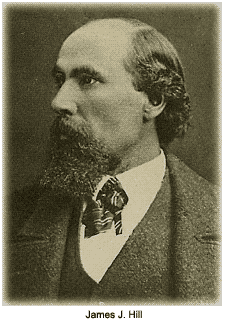James Jerome Hill was born in a log cabin near Rockwood, Ontario, Canada. In 1856, he moved to St. Paul, Minnesota, and began to work in the steamboat and coal businesses. In 1878, Hill changed his orientation by joining with partners in the purchase of the St. Paul and Pacific Railroad. He planned to take the line westward through the Rockies and northward into Canada. His early efforts were dubbed “Hill’s Folly” by his critics, given that competing transcontinental lines already existed and Hill’s route took his rails through unpopulated wilderness areas.
 Undeterred by the doubters, James J. Hill pushed ahead, and reached Seattle by 1893. While most of his competitors failed during the depression, Hill prospered, proving the wisdom of his conservative building plan. He laid track in small increments, usually about 200 miles. He then stopped construction and concentrated on attracting farmers and other settlers to the temporary terminus. He thus built up a population base to support his rail line. This segmented approach required 10 years to complete, but the result was financially sound.
Also noteworthy about James J. Hill’s effort was that he received no government aid — unique among the transcontinental lines. This feat was all the more remarkable because of the difficult topographical challenges posed by the Rockies and Cascades. Hill also prospered because of his willingness to construct “feeder lines” — short tracks that branched out from the main line to serve specific mines, logging enterprises, ranches, and other businesses. In 1890, Hill’s venture took the name of the Great Northern Railway Co.
The Northern Pacific Railroad was a direct competitor, but that line failed in 1893. Hill's effort to acquire the Northern Pacific was thwarted, but the line ended up in the empire of a close ally, J.P. Morgan. In 1901, the two joined to purchase the Chicago, Burlington and Quincy, which gave them access to Chicago and St. Louis.
This acquisition frustrated the efforts of the great railroad magnate, E.H. Harriman. The resulting financial warfare was a prime cause of the Panic of 1901. The struggle was ended with the establishment of the controversial Northern Securities Company, a major holding company later voided by the Supreme Court.
James J. Hill was also prominent in the construction of the Canadian Pacific Railway.
He resigned as president of the Great Northern in 1907, but served on the board of directors for another five years. As a legacy, he endowed a Roman Catholic seminary and the Hill Reference Library in St. Paul. James J. Hill died on May 29, 1916, at the age of 77.
Undeterred by the doubters, James J. Hill pushed ahead, and reached Seattle by 1893. While most of his competitors failed during the depression, Hill prospered, proving the wisdom of his conservative building plan. He laid track in small increments, usually about 200 miles. He then stopped construction and concentrated on attracting farmers and other settlers to the temporary terminus. He thus built up a population base to support his rail line. This segmented approach required 10 years to complete, but the result was financially sound.
Also noteworthy about James J. Hill’s effort was that he received no government aid — unique among the transcontinental lines. This feat was all the more remarkable because of the difficult topographical challenges posed by the Rockies and Cascades. Hill also prospered because of his willingness to construct “feeder lines” — short tracks that branched out from the main line to serve specific mines, logging enterprises, ranches, and other businesses. In 1890, Hill’s venture took the name of the Great Northern Railway Co.
The Northern Pacific Railroad was a direct competitor, but that line failed in 1893. Hill's effort to acquire the Northern Pacific was thwarted, but the line ended up in the empire of a close ally, J.P. Morgan. In 1901, the two joined to purchase the Chicago, Burlington and Quincy, which gave them access to Chicago and St. Louis.
This acquisition frustrated the efforts of the great railroad magnate, E.H. Harriman. The resulting financial warfare was a prime cause of the Panic of 1901. The struggle was ended with the establishment of the controversial Northern Securities Company, a major holding company later voided by the Supreme Court.
James J. Hill was also prominent in the construction of the Canadian Pacific Railway.
He resigned as president of the Great Northern in 1907, but served on the board of directors for another five years. As a legacy, he endowed a Roman Catholic seminary and the Hill Reference Library in St. Paul. James J. Hill died on May 29, 1916, at the age of 77.